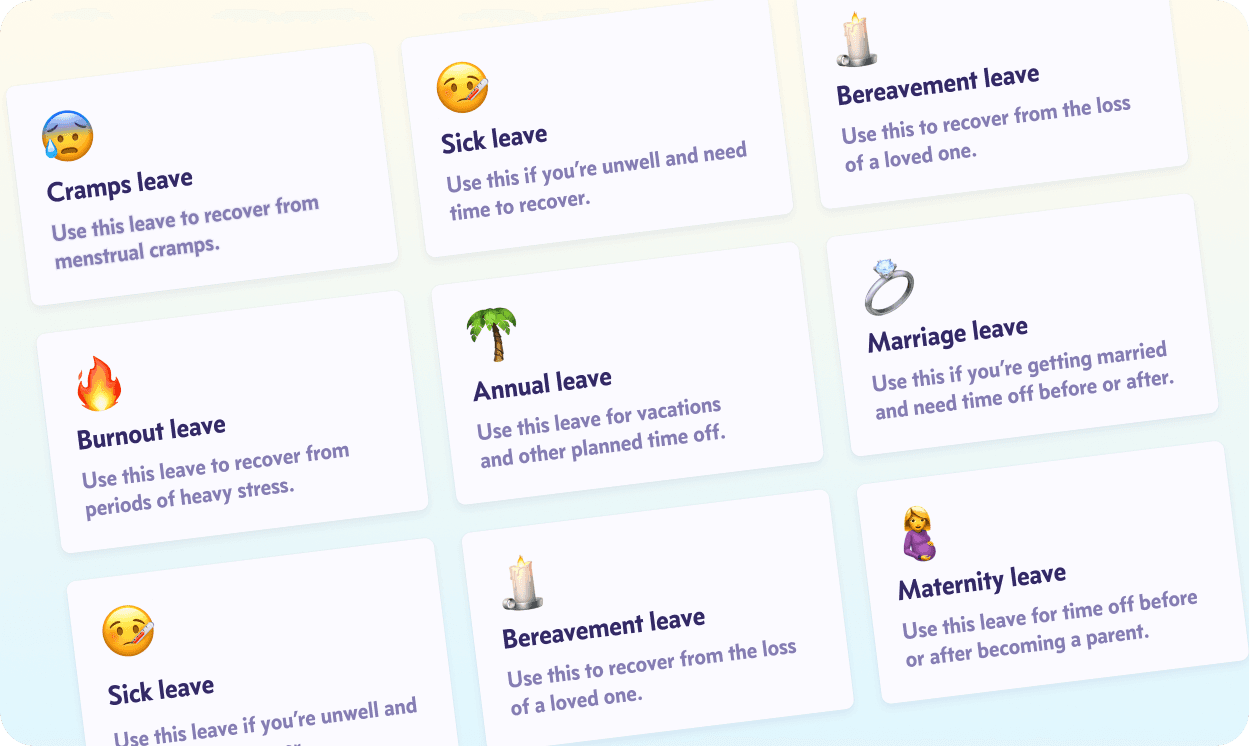The ultimate guide to compensatory leave: What it is and how to implement it
Dec 10, 2021

It's always nice to be rewarded for the extra effort you put in. This applies to time as well: if you work for a few extra hours after the end of the workday, or use up a Saturday to complete a project, then you be rewarded for it. Luckily, there's a simple way to do that: compensatory off!
What is compensatory leave?
Compensatory off (also called comp off or com-off) is a type of leave that is granted to you in compensation for the extra hours or days you've worked that you usually don't.
In simple terms, if you work on a day that is usually an off day—like the weekend or a public holiday—you get to take off on a regular workday without it being deducted from your leave balance.
Why was compensatory leave created?
Gone are the days when team members were expected to work overtime to curry favour or climb up the ladder. Today, luckily, we've begun to understand how precious our time outside of work is. Our workplaces are also so much more empathetic, and see our value in better ways.
Compensatory off is a result of such workplaces, because it prevents employees from being exploited, overworked, and forced to work for no pay.
What are the benefits of compensatory leave?
For one, a compensatory leave policy holds organisations accountable and encourages them to play fair with their employees. It negates the chances of overwork and reduces the expectation for employees to work more hours than they're expected to. It also encourages better planning to ensure work is completed during office hours.
What we love most about the compensatory off policy is that it values time off and encourages it. In some circumstances, you might need to work a few extra hours, but that doesn't mean you shouldn't get that time back to spend as you wish.
What are the rules around compensatory leave?
To help employees apply for compensatory leave smoothly, it helps to have guidelines or a fixed compensatory off policy. Some aspects include:
Specified working hours and working days
A compensatory off policy should detail how many days a week are considered official working days. Most workplaces work from Monday to Friday, but there are a handful who have 6-day work weeks, or even 4-day workweeks.
It also helps to specify how many hours employees are expected to work per day, especially if they're paid by the hour. If you'd like a looser guideline, then specifying that office hours close at a fixed time each day—like 5 or 6PM—might help.
Working on public holidays
Most public holidays are mandatory so those who need to work on a public holiday should ideally be entitled to a compensatory off. That said, if someone works on a public holiday by mistake because they didn't know, that's a whole other kettle of fish. Psst: you can prevent this from happening by downloading a public holiday calendar for your team or setting up Slack notifications with Pause.
Payment instead of compensatory leave
Some organisations allow employees to trade unused compensatory leave days for payment. This can ensure that employees are compensated in another manner for working late hours or for completing work within office hours (which is a major win!). It's good to include guidelines about this factor in your guide to compensatory off.
How does one apply for compensatory leave?
The steps to apply for comp off differ from organisation to organisation. But that said, we've put down a few pointers to nudge you in the right direction!
Check the guidelines
Before putting in a comp off request, we'd recommend that employees go through the organisation's guidelines. This'll help everyone go about their application the right way. It'll also ensure there aren't any errors that could cause back-and-forth during the application process.
Apply for comp off
This is the fun part: applying for comp off to get back the extra time worked for! Depending on the organisation's system, this could look like an email to HR, a Slack message to a manager, or an input in a common Excel sheet. If you use Pause, it means applying through your dashboard or using the /pause slash command on Slack.
Respond to a compensatory leave request
Once a compensatory leave request has gone to a manager, the ball's in their court to approve the request. They might do this by confirming the hours or overtime days an employee's claiming a comp-off day against. They might also choose to approve or reject the request depending on the days selected.
The final word
Compensatory off is a great method of showing employees that their time is valuable and should be respected. It holds both employees and organisations accountable and ensures the true worth of everyone's time is recognised!
Pause makes booking compensatory off and managing leave policies as easy as can get. If you'd like to see just how easy it is to book time off, why not try it free for 30 days?



